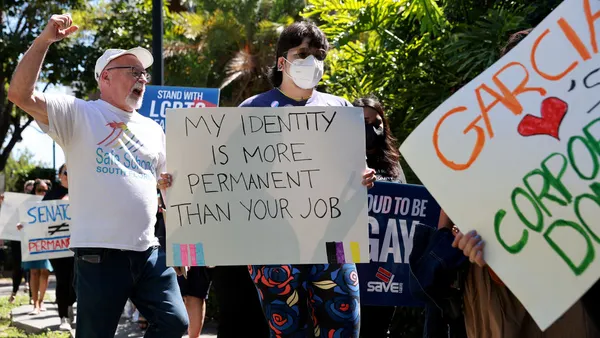Dive Brief:
-
Texas book stores and national associations representing publishers and authors filed a lawsuit last week against HB 900, a state law that requires booksellers and publishers to review and rate books' sexual content if they are being sold to school libraries. The law, which takes effect Sept. 1, also requires a recall on any past "sexually explicit" material sold to schools.
-
Plaintiffs are seeking to both temporarily and permanently block the law. They claim it violates the First and 14th Amendments by regulating speech, using vague terms and delegating the power to regulate speech to private entities.
-
The lawsuit — filed by the American Booksellers Association and the Association of American Publishers, among other groups and local bookstores — marks yet another legal challenge by publishers, authors and vendors to curriculum censorship laws.
Dive Insight:
Parents, students, educators, civil rights groups and education associations have filed lawsuits against several curriculum laws nationwide in the past year. Publishers have recently joined the fray as the threat of book bans becomes more prevalent in these curriculum disputes.
For example, Penguin Random House joined authors in a lawsuit filed in May over a Florida school district's book ban.
That lawsuit claimed Escambia County School District removed books from public school libraries based on disagreements with ideas expressed in the books. Plaintiffs claim the removal process ignored the proper way to remove books from shelves and discriminated against people of color and LGBTQ+ people.
The lawsuit seeks preliminary and permanent injunctive relief, similar to the one challenging HB 900 in Texas.
Many suits challenging curriculum laws also claim these legislative measures are vaguely worded and therefore unclear and difficult to follow. The Texas lawsuit, for example, alleges the law requires booksellers and publishers to "rate books based on subjective and vague standards."
Under HB 900, local and national booksellers and publishers are required to rate all content sold to schools, including past content, as "sexually relevant" or "sexually explicit."
“From a logistical angle, this law creates an impossibly onerous and cumbersome process that bookstores and other vendors must follow, forcing them to review massive amounts of material without the benefit of clear and workable standards, and compelling them to recall titles previously sold over an indeterminate period of time," reads a joint statement from American Booksellers Association CEO Allison Hill, Association of American Publishers President and CEO Maria Pallante, and others.
Plaintiffs also claim that setting content guidelines should not be in the hands of the government.
"It is the local librarian’s and teacher’s job, in conjunction with the community they serve," said Charley Rejsek, CEO of BookPeople, a Texas-based independent bookstore, in a statement. Rejsek added that booksellers also don't have the training or resources necessary to comply with the law.
In a similar vein, other lawsuits challenging curriculum laws also claim that these measures make it difficult for teachers to do their jobs and put them at risk.
For example, a lawsuit filed this month challenging Tennessee's "divisive concepts" law claims the statute is subjective, vague and keeps teachers from fulfilling their obligation to educate kids according to state standards.













